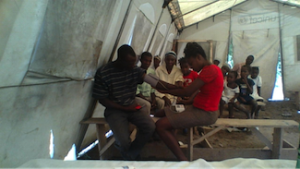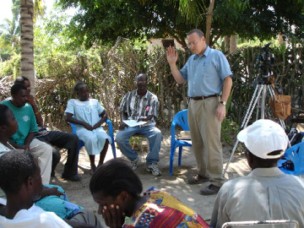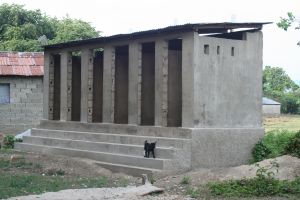Long Term Healthcare
Traditional short-term medical work teams have typically focused on immediate attention to the medical needs of patients in Haiti. This is extremely important and a much-needed service. However, with an estimated 50- 90% of the health problems encountered in these mobile clinics being preventable, the obvious need is for more teaching and definitive action for the prevention of disease and illness in the first place. As a result, HCDP has taken action to employ local healthcare workers, involve local schools in dialogues and demonstrations, and participate in long-term planning to achieve a higher level of prevention.
The goal of our long-term health care projects is to educate the local people in the Artibonite Valley so that they can follow the best practices in healthcare and better protect themselves against illnesses that could be otherwise prevented with the proper knowledge.
Listed below, HCDP currently has three projects that address long-term health care in Haiti.
Preventative Health Care Training
 Olina Florestal, pictured left, is HCDP’s community health worker. She has been trained at the Jubilee School in Gonaives and she visits many villages in the surrounding Artibonite Valley in order to promote preventative health care. In the picture, she is taking a patient’s blood pressure in an effort to treat hypertension, or high blood pressure, which is a common diagnosis in Haiti. Uncontrolled high blood pressure increases your risk of serious health problems, including heart attack and stroke but it can be avoided by maintaining a healthy weight, cutting back on salt, and eating a balanced diet.
Olina Florestal, pictured left, is HCDP’s community health worker. She has been trained at the Jubilee School in Gonaives and she visits many villages in the surrounding Artibonite Valley in order to promote preventative health care. In the picture, she is taking a patient’s blood pressure in an effort to treat hypertension, or high blood pressure, which is a common diagnosis in Haiti. Uncontrolled high blood pressure increases your risk of serious health problems, including heart attack and stroke but it can be avoided by maintaining a healthy weight, cutting back on salt, and eating a balanced diet.
Public Health Video Project
 Even in a developing country like Haiti, television is becoming an increasingly popular medium and provides great potential for teaching. But what happens when a movie is made with local actors speaking to other Haitians in their native Creole? When Oneal Tankersly, a long-time missionary and HCDP volunteer from Harding University, began to produce local videos in order to teach principles of preventative long-term health care more effectively, the impact was much greater than we could have originally anticipated. These videos have been produced both on VHS tapes and DVDs to make them inexpensive and available to a wide audience in Haiti. Some of the videos are even played on local television stations!
Even in a developing country like Haiti, television is becoming an increasingly popular medium and provides great potential for teaching. But what happens when a movie is made with local actors speaking to other Haitians in their native Creole? When Oneal Tankersly, a long-time missionary and HCDP volunteer from Harding University, began to produce local videos in order to teach principles of preventative long-term health care more effectively, the impact was much greater than we could have originally anticipated. These videos have been produced both on VHS tapes and DVDs to make them inexpensive and available to a wide audience in Haiti. Some of the videos are even played on local television stations!
Latrine Construction
 Proper disposal of human waste is one of the most important public health measures in any country. Educating Haitian people about the importance is very important. However, because of the scarcity of wood and other building materials, developing appropriate latrine models for the surrounding communities and then gaining acceptance and implementation is a major challenge.
Proper disposal of human waste is one of the most important public health measures in any country. Educating Haitian people about the importance is very important. However, because of the scarcity of wood and other building materials, developing appropriate latrine models for the surrounding communities and then gaining acceptance and implementation is a major challenge.
HCDP has partnered with some communities to provide building materials for community latrines which then have been constructed by local artisans. These “Arbor–loos” consist of the construction of temporary pits with a temporary hut which then becomes the soil base for planting trees and orchards. These provide for appropriate waste disposal as well as providing positive ecological benefits and food production.
